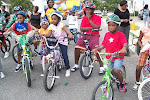Please don't go
 |
| L-R, Anton, Beth, Matt, Melanie |
These four Eastern Virginia Medical College students are good examples of people that we probably want to retain here. Matt is from Chesapeake, while the other three relocated here to attend EVMS—Anton from Northern VA, Beth from Boston and Melanie from Toronto. I have ridden alongside them for a couple of years now, and what I have learned is that their rides in Norfolk make up most of their very limited recreation time. They have YMCA memberships, complements of their paid tuition to EVMS, but their outdoor exercise time is limited to a couple of rides a week, resulting in them being heavily dependent on cycling for recreation right now. Even so, their perceptions of how cycling friendly the region is not the most pressing thing on their minds right now, but I wonder what will be going through their minds when residences and internships end a couple of years from now.
I wonder how excited they will be about staying in Hampton Roads. Will they want to practice closer to where they grew up? Will they gravitate toward another region of the US where they have always wanted to live? Maybe they will serve in developing countries desperate for physicians. I wonder if any of them will weigh the benefits of staying here in town to build a career. If so, it appears that cycling will play at least some role in their decision. IF they have had had favorable experiences with drivers, city involvement and improvements throughout their EVMS years, I think cycling would be just one of many factors.
However, I think it becomes a MAJOR factor in a decision if these experiences have been unfavorable. Why would they want to stay in a community after working so hard if they can’t enjoy their sport? What does it say about a community if there are no advances made in improving cycling over after 5 or 6 years, especially in an era when large, more condensed cities like New York, Chicago, DC, San Francisco have been successful in making it happen, and areas with populations similar to ours—Louisville, Raleigh-Durham for instance—have made strides also?

